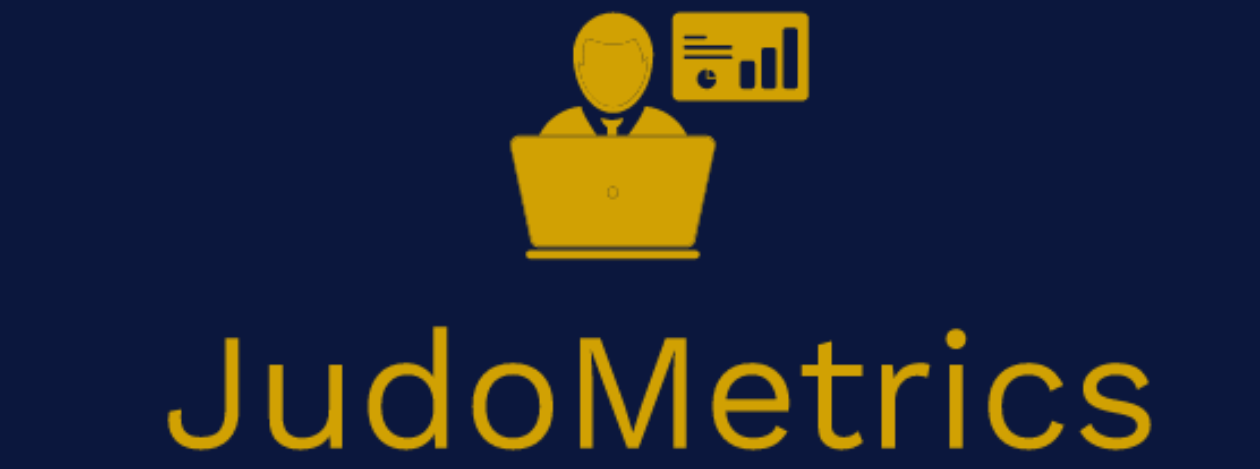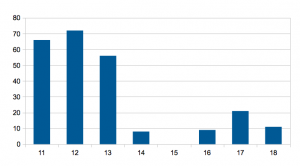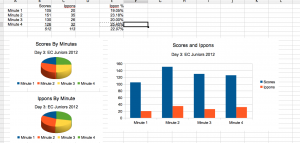Today was the heavier weights here in Qingdao, so when looking at the data perhaps there is a difference in the pattern to that from day one?
Day 2 (-70, -78, +78, -81, -90, -100, +100), Opening Rounds:
Total Scores: 139
Scores in 1st minute: 21
Scores in 2nd minute: 34
Scores in 3rd minute: 34
Scores in 4th minute: 37
Scores in 5th minutes: 13
Ippon scores in 1st minute: 6
Ippon scores in 2nd minute: 6
Ippon scores in 3rd minute: 9
Ippon scores in 4th minute: 10
Ippon scores in 5th minutes: 5
Day 2 (-70, -78, +78, -81, -90, -100, +100), Gold Medal Fights:
Total Scores: 19
Scores in 1st minute: 1
Scores in 2nd minute: 4
Scores in 3rd minute: 4
Scores in 4th minute: 6
Scores in 5th minutes: 4
Ippon scores in 1st minute: 1
Ippon scores in 2nd minute: 0
Ippon scores in 3rd minute: 1
Ippon scores in 4th minute: 2
Ippon scores in 5th minutes: 2
It is also worth noting that the numbers quoted here include all changes to the IJF scoreboards, so includes scores later changed. The minute times mentioned include the golden score as well; so again care must be taken when interpreting the numbers. All this data is included in a database should people be interested in doing some research and analysis.
Of course this is a small sample, but it is interesting none the less to look at the numbers and especially to look at the differences between light and heavy. We need to consider also where we are in the Olympic cycle and how that affects the players attending the event and the level of preparation and focus they might have on the day.
Your comments on this are invited and appreciated.
Preliminary rounds, results:
GP_CHN2012 -100kg Mat:2 2:57 NUNES, Renan (BRA) 100(1)-000(0) DORJ, Anar (MGL)
GP_CHN2012 -100kg Mat:2 2:50 BAUZA, Karolis (LTU) 100(1)-000(0) XU, Xin (CHN)
GP_CHN2012 -81 kg Mat:1 2:04 KHABACHIROV, Murat (RUS) 001(1)-000(1) CHO, Seung Kwon (KOR)
GP_CHN2012 -70 kg Mat:3 0:58 CHEN, Yun-Ting (TPE) 100(0)-000(0) KAUR, Gagandeep (IND)
GP_CHN2012 -100kg Mat:2 2:28 ASANUMA, Takumi (JPN) 000(0)-100(0) XU, Jie (CHN)
GP_CHN2012 -70 kg Mat:3 1:51 MERLI, Nadia (BRA) 000(0)-100(0) OSUMI, Yuka (JPN)
GP_CHN2012 -100kg Mat:2 2:14 MAGOMEDOV, Shamil (RUS) 001(1)-100(2) KIM, Do Hyoung (KOR)
GP_CHN2012 -81 kg Mat:1 0:00 OTGONBAATAR, Uuganbaatar (MGL) 011(0)-000(0) EBI, Yasuhiro (JPN)
GP_CHN2012 -70 kg Mat:3 4:08 VARGAS KOCH, Laura (GER) 110(0)-000(0) CHEN, Rong (CHN)
GP_CHN2012 -81 kg Mat:1 4:24 DAVIS, Thomas (GBR) 100(0)-000(0) GAO, Haiyuan (CHN)
GP_CHN2012 -100kg Mat:2 1:46 CORREA, Luciano (BRA) 100(0)-000(1) ZHAO, Dongming (CHN)
GP_CHN2012 -81 kg Mat:1 3:06 PENALBER, Victor (BRA) 101(0)-000(2) KUMAR, Manoj (IND)
GP_CHN2012 -100kg Mat:2 3:52 KUMAR, Pramod (IND) 000(0)-100(0) KUMASHIRO, Yusuke (JPN)
GP_CHN2012 -70 kg Mat:3 0:00 HAN, Weiyan (CHN) 010(1)-000(3) YOU, Mee Won (KOR)
GP_CHN2012 -81 kg Mat:1 2:23 WU, Wen Shun (TPE) 000(0)-101(0) WANG, Xuewen (CHN)
GP_CHN2012 -100kg Mat:2 3:56 YUAN, Jinling (CHN) 100(0)-000(0) HONG, Yi Chih (TPE)
GP_CHN2012 -81 kg Mat:1 2:42 GAN, Tuvshinjargal (MGL) 101(0)-000(2) TURABOEV, Bekzod (UZB)
GP_CHN2012 -100kg Mat:2 1:14 LIM, Seung Rok (KOR) 000(1)-100(1) HUSSAIN, Shah (PAK)
GP_CHN2012 -78 kg Mat:1 4:01 YANG, Xiuli (CHN) 001(0)-100(0) HIDAKA, Misaki (JPN)
GP_CHN2012 -70 kg Mat:3 0:00 TSEND AYUSH, Naranjargal (MGL) 000(1)-000(0) ZHOU, Chao (CHN)
GP_CHN2012 -90 kg Mat:2 2:25 SINGH, Avtar (IND) 000(1)-100(0) ZHANG, Jun (CHN)
GP_CHN2012 -78 kg Mat:1 1:13 ZHANG, Jie (CHN) 100(0)-000(0) HSU, Hsin-Mei (TPE)
GP_CHN2012 -78 kg Mat:1 4:04 VELENSEK, Anamari (SLO) 100(0)-000(0) CHEN, Ying (CHN)
GP_CHN2012 -78 kg Mat:1 3:15 WANG, Szu-Chu (TPE) 000(0)-100(0) HAN, Li (CHN)
GP_CHN2012 -70 kg Mat:3 0:15 POGACNIK, Anka (SLO) 001(0)-110(1) TAKAHASHI, Rui (JPN)
GP_CHN2012 -90 kg Mat:2 0:00 KIM, Kwang-Ho (KOR) 001(1)-000(2) ZHANG, Zhongbo (CHN)
GP_CHN2012 -81 kg Mat:1 2:18 KHABACHIROV, Murat (RUS) 111(0)-000(0) ZHANG, Wentao (CHN)
GP_CHN2012 -100kg Mat:2 1:43 NUNES, Renan (BRA) 100(1)-000(0) BAUZA, Karolis (LTU)
GP_CHN2012 +100kg Mat:3 0:30 ULZIIBAYAR, Duurenbayar (MGL) 000(0)-100(0) WANG, Quanchao (CHN)
GP_CHN2012 +78 kg Mat:3 5:00 QIN, Qian (CHN) 100(0)-000(0) WOO, Jung-Min (KOR)
GP_CHN2012 -100kg Mat:2 1:53 XU, Jie (CHN) 000(2)-101(0) KIM, Do Hyoung (KOR)
GP_CHN2012 -81 kg Mat:1 1:35 OTGONBAATAR, Uuganbaatar (MGL) 001(0)-000(2) DAVIS, Thomas (GBR)
GP_CHN2012 +78 kg Mat:3 0:00 WANG, Rui (CHN) 002(1)-000(0) ICHIHASHI, Suzuka (JPN)
GP_CHN2012 -81 kg Mat:1 0:00 PENALBER, Victor (BRA) 001(0)-000(2) WANG, Xuewen (CHN)
GP_CHN2012 -100kg Mat:2 0:00 CORREA, Luciano (BRA) 000(2)-001(0) KUMASHIRO, Yusuke (JPN)
GP_CHN2012 +78 kg Mat:3 0:00 ALTHEMAN, Maria Suelen (BRA) 000(2)-002(0) LI, Yang (CHN)
GP_CHN2012 -100kg Mat:2 2:43 YUAN, Jinling (CHN) 101(0)-000(0) HUSSAIN, Shah (PAK)
GP_CHN2012 -81 kg Mat:1 1:57 GAN, Tuvshinjargal (MGL) 001(1)-100(2) LI, Maojian (CHN)
GP_CHN2012 -70 kg Mat:3 1:52 PORTELA, Maria (BRA) 100(0)-000(1) CHEN, Yun-Ting (TPE)
GP_CHN2012 -90 kg Mat:2 3:49 SULEMIN, Grigorii (RUS) 002(4)-100(0) ZHANG, Jun (CHN)
GP_CHN2012 -90 kg Mat:2 0:54 LI, Kunpeng (CHN) 000(0)-101(0) HUH, Chae Goo (KOR)
GP_CHN2012 -78 kg Mat:1 0:00 HIDAKA, Misaki (JPN) 001(0)-000(2) CHOI, Mi-Young (KOR)
GP_CHN2012 -70 kg Mat:3 0:00 OSUMI, Yuka (JPN) 000(1)-100(1) VARGAS KOCH, Laura (GER)
GP_CHN2012 -90 kg Mat:2 0:00 KIM, Kwang-Ho (KOR) 001(1)-000(2) LKHAGVASUREN, Otgonbaatar (MGL)
GP_CHN2012 -78 kg Mat:1 1:29 JUNG, Da Woon (KOR) 010(1)-000(1) ZHANG, Jie (CHN)
GP_CHN2012 -78 kg Mat:1 4:44 VELENSEK, Anamari (SLO) 100(0)-000(0) CHONGTHAM, Jina Devi (IND)
GP_CHN2012 -70 kg Mat:3 0:54 CHEN, Fei (CHN) 001(1)-000(2) HAN, Weiyan (CHN)
GP_CHN2012 -90 kg Mat:2 0:00 CHENG, Xunzhao (CHN) 010(1)-001(0) KITANO, Yuichi (JPN)
GP_CHN2012 -78 kg Mat:1 1:47 POWELL, Natalie (GBR) 010(1)-100(0) HAN, Li (CHN)
GP_CHN2012 -70 kg Mat:3 3:15 ZHOU, Chao (CHN) 100(0)-000(0) TAKAHASHI, Rui (JPN)
GP_CHN2012 +100kg Mat:3 1:42 PASKEVICIUS, Marius (LTU) 100(0)-000(0) WANG, Zhen (CHN)
GP_CHN2012 +100kg Mat:3 4:08 WANG, Quanchao (CHN) 100(0)-000(0) LEE, Po Yen (TPE)
GP_CHN2012 +100kg Mat:3 0:00 SAIDOV, Renat (RUS) 001(1)-000(2) SHEN, Zhuhong (CHN)
GP_CHN2012 +100kg Mat:3 1:05 KIM, Soo-Whan (KOR) 000(2)-001(1) WANG, Qiang (CHN)
Semifinals:
GP_CHN2012 -81 kg Mat:2 0:46 KHABACHIROV, Murat (RUS) 001(0)-000(1) OTGONBAATAR, Uuganbaatar (MGL)
GP_CHN2012 -81 kg Mat:2 2:00 PENALBER, Victor (BRA) 100(0)-000(0) LI, Maojian (CHN)
GP_CHN2012 -70 kg Mat:2 2:29 PORTELA, Maria (BRA) 002(0)-001(0) VARGAS KOCH, Laura (GER)
GP_CHN2012 -70 kg Mat:2 0:00 CHEN, Fei (CHN) 010(1)-000(3) ZHOU, Chao (CHN)
GP_CHN2012 -90 kg Mat:2 0:00 ZHANG, Jun (CHN) 001(0)-000(1) HUH, Chae Goo (KOR)
GP_CHN2012 -90 kg Mat:2 2:36 KIM, Kwang-Ho (KOR) 000(0)-100(1) CHENG, Xunzhao (CHN)
GP_CHN2012 -78 kg Mat:2 0:51 HIDAKA, Misaki (JPN) 000(2)-001(0) JUNG, Da Woon (KOR)
GP_CHN2012 -78 kg Mat:2 4:24 VELENSEK, Anamari (SLO) 100(0)-000(0) HAN, Li (CHN)
GP_CHN2012 -100kg Mat:2 0:00 NUNES, Renan (BRA) 002(0)-001(1) KIM, Do Hyoung (KOR)
GP_CHN2012 -100kg Mat:2 0:00 KUMASHIRO, Yusuke (JPN) 001(1)-000(0) YUAN, Jinling (CHN)
GP_CHN2012 +78 kg Mat:2 2:54 QIN, Qian (CHN) 101(0)-000(0) WANG, Rui (CHN)
GP_CHN2012 +78 kg Mat:2 0:00 LI, Yang (CHN) 000(2)-001(1) YU, Song (CHN)
GP_CHN2012 +100kg Mat:2 2:09 PASKEVICIUS, Marius (LTU) 110(0)-000(1) WANG, Quanchao (CHN)
GP_CHN2012 +100kg Mat:2 0:00 SAIDOV, Renat (RUS) 010(2)-001(3) WANG, Qiang (CHN)
Gold Medal Fights:
GP_CHN2012 -81 kg Mat:2 2:43 KHABACHIROV, Murat (RUS) 000(0)-100(0) PENALBER, Victor (BRA)
GP_CHN2012 -70 kg Mat:2 1:59 PORTELA, Maria (BRA) 000(1)-100(1) CHEN, Fei (CHN)
GP_CHN2012 -90 kg Mat:2 1:27 ZHANG, Jun (CHN) 000(1)-100(1) CHENG, Xunzhao (CHN)
GP_CHN2012 -78 kg Mat:2 0:00 JUNG, Da Woon (KOR) 000(2)-102(0) VELENSEK, Anamari (SLO)
GP_CHN2012 -100kg Mat:2 4:41 NUNES, Renan (BRA) 000(0)-100(0) KUMASHIRO, Yusuke (JPN)
GP_CHN2012 +78 kg Mat:2 0:00 QIN, Qian (CHN) 000(1)-000(1) YU, Song (CHN)
GP_CHN2012 +100kg Mat:2 0:04 PASKEVICIUS, Marius (LTU) 110(2)-001(1) SAIDOV, Renat (RUS)




